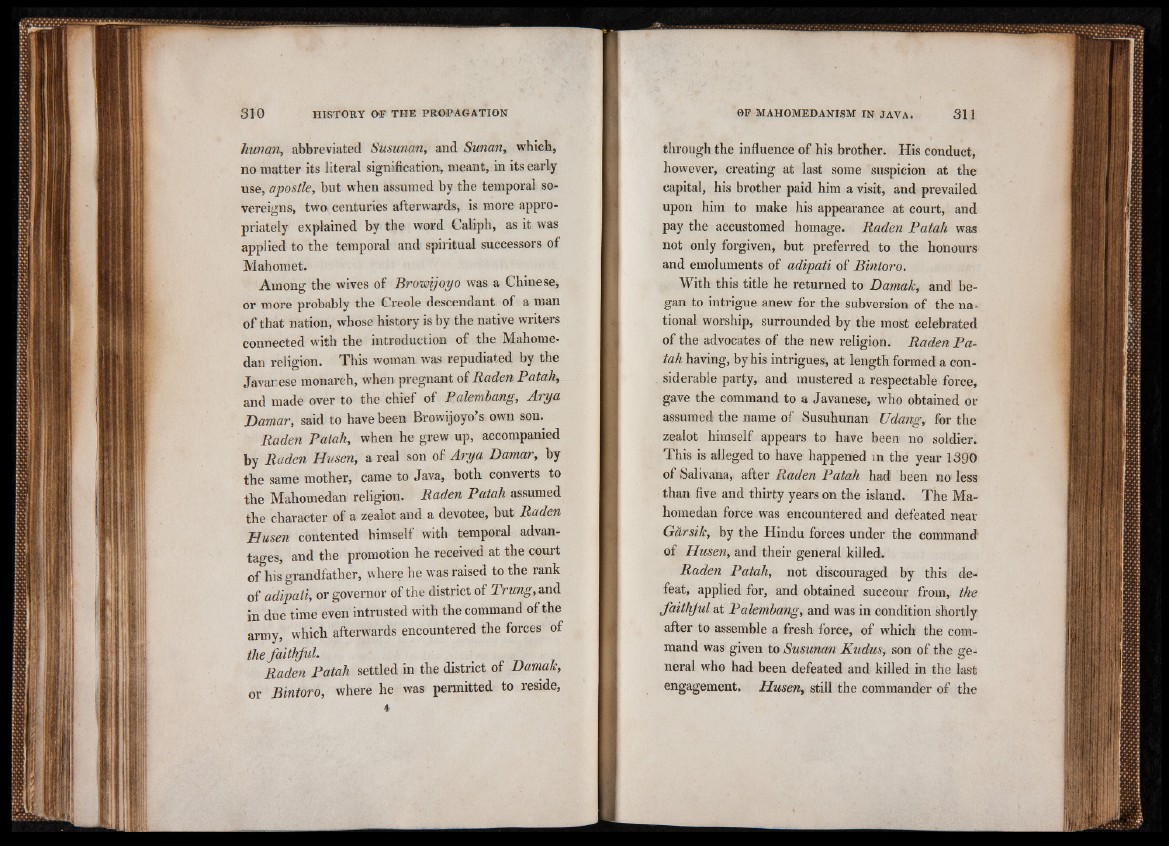
hunan, abbreviated Susunan, and Sunan, which,
no matter its literal signification, meant, in its early
use, apostle, but when assumed by the temporal sovereigns,
two centuries afterwards, is more appropriately
explained by the word Caliph, as it was
applied to the temporal and spiritual successors of
Mahomet.
Among the wives of Bromjoyo was a Chinese,
or more probably the Creole descendant of a man
of that nation, whose history is by the native writers
connected with the introduction of the Mahome-
dan religion. This woman was repudiated by the
Javanese monarch, when pregnant of Raden Patah,
and made over to the chief of Palembang, Arya
Damar, said to have been Browijoyo’s own son.
Raden Patah, when he grew up, accompanied
by Raden Husen, a real son of Arya Damar, by
the same mother, came to Java, both converts to
the Mahomedan religion. Raden Patah assumed
the character of a zealot and a devotee, but Raden
Husen contented himself with temporal advantages,
and the promotion he received at the court
of his grandfather, where he was raised to the rank
of adipati, or governor of the district of Trung, and
in due time even intrusted with the command of the
army, which afterwards encountered the forces of
theR faaidthefnu lP.atah settled in the district of Damak,
or Bintoro, where he was permitted to reside,
through the influence of his brother. His conduct,
however, creating at last some suspicion at the
capital, his brother paid him a visit, and prevailed
upon him to make his appearance at court, and
pay the accustomed homage. Raden Patah was
not only forgiven, but preferred to the honours
and emoluments of adipati of Bintoro.
With this title he returned to Damak, and began
to intrigue anew for the subversion of the national
worship, surrounded by the most celebrated
of the advocates of the new religion. Raden Patah
having, by his intrigues, at length formed a considerable
party, and mustered a respectable force,
gave the command to a Javanese, who obtained or
assumed the name of Susuhunan Udang, for the
zealot himself appears to have been no soldier.
This is alleged to have happened m the year 1390
ofSalivana, after Raden Patah had! been no less
than five and thirty years on the island. The Mahomedan
force was encountered and defeated near
Gdrsik, by the Hindu forces under the command
of Husen, and their general killed.
Raden Patah, not discouraged by this defeat,
applied for, and obtained succour from, Ike
faithful at Palembang, and was in condition shortly
after to assemble a fresh force, of which the command
was given to Susunan Kudus, son of the general
who had been defeated and killed in the last
engagement. Husen, still the commander of the